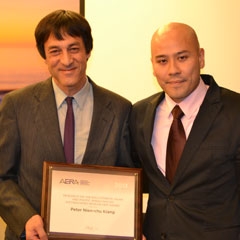Boston, June 28, 2013, — Peter Kiang, director of the University of Massachusetts Boston’s Asian American Studies Program, was surprised to learn he was being nationally recognized for his research work around improving education for Asian Americans, refugee, and immigrant populations.

UMass Boston Professor Peter Kiang (left) and REAPA Chair Sam Museus at AERA 2013 in San Francisco.
|
|
But for his colleagues who have observed his impact on Asian American studies courses and the community over the last 30 years, the honor was no surprise at all.
“It is impossible to argue against the importance of his academic career to our field,” Vichet Chhuon, an assistant professor of culture and teaching at the University of Minnesota-Twin Cities, wrote in his nomination letter. |
Kiang, also a professor of curriculum and instruction in the College of Education and Human Development, received the 2013 Distinguished Scholar Award from the American Educational Research Association (AERA) Special Interest Group: Research on the Education of Asian and Pacific Americans (SIG: REAPA) in San Francisco in April. The AERA is a national research society that promotes the use of research to improve education.
|
|
“I was surprised,” Kiang said. “In my work in particular, which has focused on the local populations and the local students of UMass Boston who are predominantly working class immigrant refugee background, those student profiles are not typically in the dominant education research literature, so the award was not just recognizing my own scholarly contributions or accomplishments, but it was really recognizing the importance to the field of work with these populations.” |
Featured in the Chronicle of Higher Education and highlighted by the Association of American Colleges & Universities as a national model, UMass Boston’s Asian American Studies Program offers the most Asian American studies courses, faculty, and community resources of any university in New England. Kiang’s research focuses on the impact of education in three areas: the development of Asian American studies programs, the connection between veterans and Asian American studies, and continuing education with the refugee and immigrant populations.
“I’m really interested in kind of following the continuing impact of Asian American studies in the lives of the alumni as they make different decisions about their next or the final phases of their careers and professional work or their decision-making about how they’re raising their kids or their engagement civically, politically in their neighborhoods, cities, and communities. Most of them are still local, and many of them are community leaders. They’re directors or significant staff in Asian American community organizations in Chinatown and Dorchester and Lynn and Revere and Lowell,” Kiang said.

Renee Covalucci(left), Peter Kiang(third from right in the back row), Dr. Wanli Hu (first from right in the back row) with members of the UMB Asian American Studies program celebrate Chinese Cultural Day on June 1 at Josiah Quincy Elementary School in Chinatown.
Kiang wants to do more work with another type of alumni: Asian American veterans. Because of their experiences with war and trauma and their connections to the land and culture and people of Southeast Asia, Vietnam veterans were very interested in UMass Boston’s Asian American Studies Program in the 1980s, and pushed for even more classes.
“The educational pathways and connections between the veteran experience, the student experience, and Asian American studies as a context for their learning and support, academically, emotionally, civically, those were really important in our roots at UMass Boston in the 80s and they’ve reemerged. There’s a particular focus of my own work that is really looking at [Asian American veterans], and particularly, the ironies of those veterans whose parents escaped from war as refugees and then their sons and daughters are going back into war. That wasn’t supposed to be the scenario of coming to the United States, but for various reasons, that is the story of many of our students,” Kiang said.
Kiang and other members of the Asian American Studies Program faculty are also making connections with Mather Elementary School in Dorchester, the oldest public elementary school in the United States. Last year, nearly 40 percent of the students were Vietnamese Americans. Four teachers at the school are graduates of the Asian American Studies Program.
“Many students don’t plan to become teachers, but after taking a lot of Asian American studies [classes,] they want to be doing more, whether it’s in the community or in some kind of educational context and the Mather School has just been one place where there’s this concentration of Vietnamese American alumni who are able to work together. It’s amazing,” Kiang said.
Kiang is the one of several members of the Asian American Studies Program faculty to receive national recognition in the last three months. Associate Professor of Nursing Haeok Lee was selected as a fellow of the American Academy of Nursing, and on May 6, the White House honored Karen L. Suyemoto, an associate professor of clinical psychology and Asian American studies, and 14 other Asian American and Pacific Islander (AAPI) women as “Champions of Change.”
About UMass Boston
With a growing reputation for innovative research addressing complex issues, the University of Massachusetts Boston, metropolitan Boston’s only public university, offers its diverse student population both an intimate learning environment and the rich experience of a great American city. UMass Boston’s ten colleges and graduate schools serve nearly 16,000 students while engaging local, national, and international constituents through academic programs, research centers, and public service activities. To learn more about UMass Boston, visit www.umb.edu.